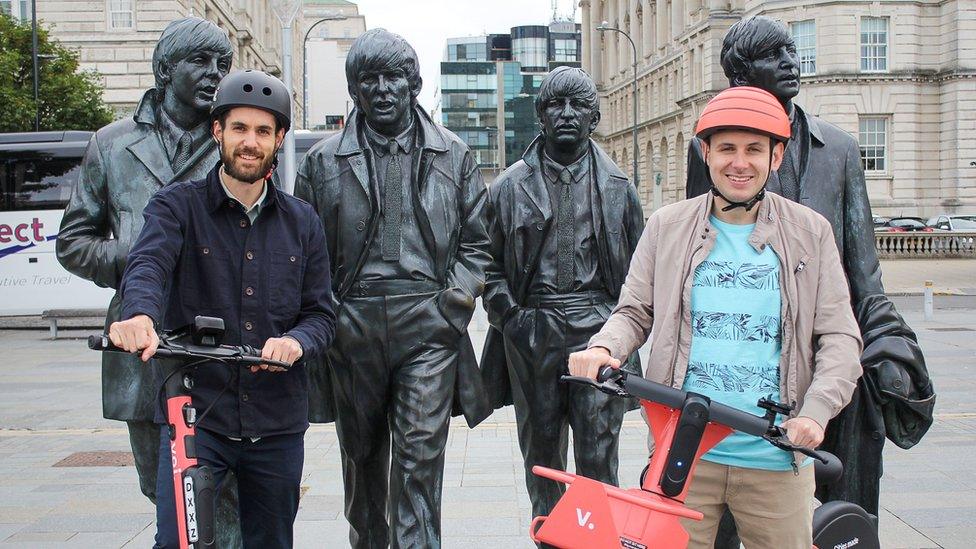Sustainability: E-bike loans aim to tame Wales' hilly towns
- Published

Gemma Loveless has become a keen proponent of Sustrans's e-bike scheme since taking part
If you have ever been on a bike and been daunted by a steep hill approaching, you will have some sympathy for those who choose a car over pedal power.
Gemma Loveless, a teacher and mother-of-two from Barry, Vale of Glamorgan, was once like this.
She used to cycle when she could but found having two small children and a hilly hometown made doing it anywhere other than on safe, flat roads difficult.
"We cycled to school and back which was when I was able to for work, which was nice and flat, and I could put the little one on the back of my bike and [my elder son] Dexter could cycle his bike," she said.
"But to use cycling as a mode of transport just wasn't possible because of the hills in Barry. The eldest goes to football up the hill - I would get in the car, straightaway."
So she proved to be a perfect test case when transport charity Sustrans rolled out its E-Move scheme, which offers free loans of e-bikes and e-cargo bikes to tempt people and businesses in pilot areas to give battery-powered pedalling a go.
Gemma came across the scheme at cycling event for Cardiff and Vale employees.
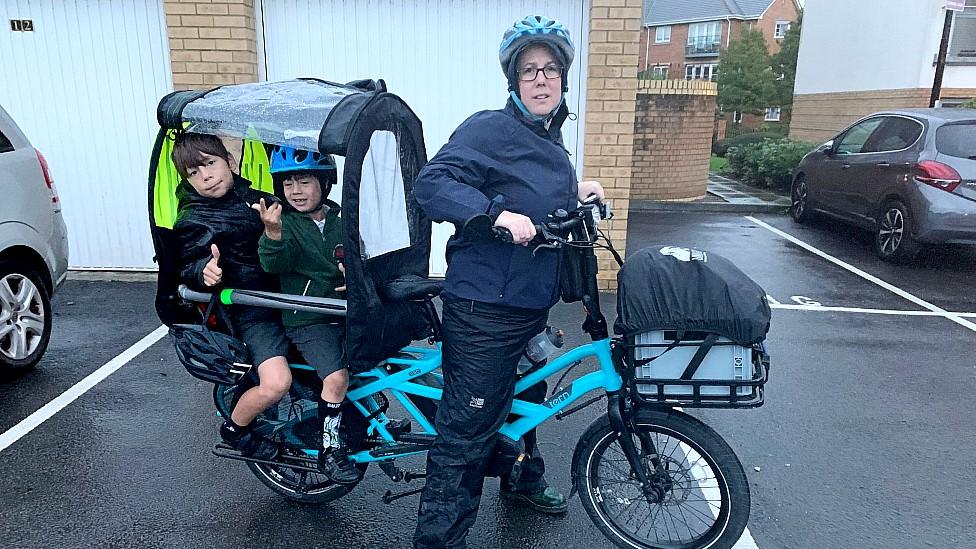
A rain cover makes the bike "feel like a car", according to Gemma's sons
She discovered she could get a month-long loan of a cargo bike she had been "coveting for a long while", with space for her children and their belongings.
"I ended up hiring it in the middle of December in cold and wet, rainy weather, but still loved it. Having had the taste of it, we went out and bought our own.
"It's brilliant. Before, I was carrying the youngest on the back of my bike and it just felt wobbly. I didn't feel confident starting off so I wouldn't have gone in traffic.
"As soon as I went on this, I could hardly feel the weight of two kids on the back. I could get going easily, I could get up the hills easily. It just didn't feel there was any sort of limitation.
"It becomes a mode of transport rather than exercise or 'going for a bike ride'."
Gemma has also found a big saving on the cost of petrol as the bike has made it possible to do the journeys which are "just that bit too far to walk".
As well as the children, the e-cargo bike can also carry their bikes, meaning she can take them to a safer location for them to cycle as well.
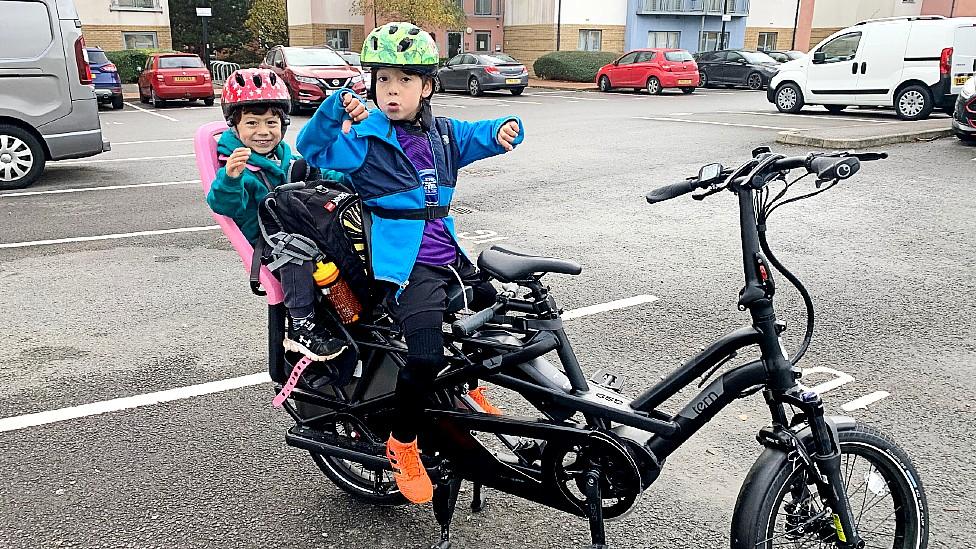
Gemma says she could hardly feel the weight of two kids on the back of the bike
Previously the role of ferrying the children had always fallen to Gemma as her husband does not drive.
"Now he can take them to football or pick them up from school easily rather than having to walk or me do it," she said.
Even though Gemma used to cycle a normal bike, she said she was definitely getting more exercise now with the e-bike, and was fitter and felt better as a result.
"The days when I cycle home, that exercise feels so good. I get home and I'm already relaxed."
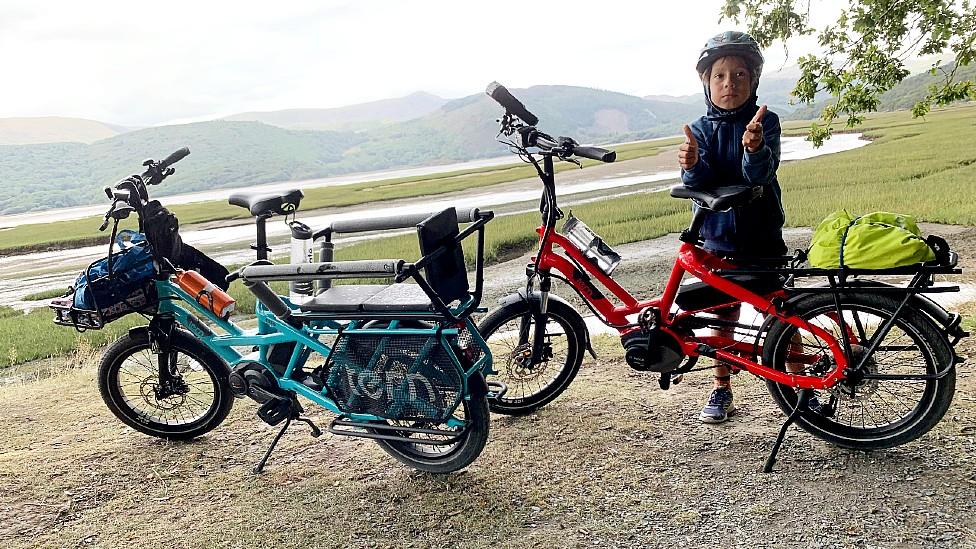
Gemma's family bought a second e-bike so they could all go out cycling together
She thinks anyone, whatever their level of experience with cycling, could benefit from the scheme.
"It becomes something that you're able to do regularly - rather than 'I've got a long day, let's go for a long bike ride,' it's 'I need to get to the shops, I can do this on an e-bike because I know I can carry more stuff home.'"
'We only use our car once or twice a month now'
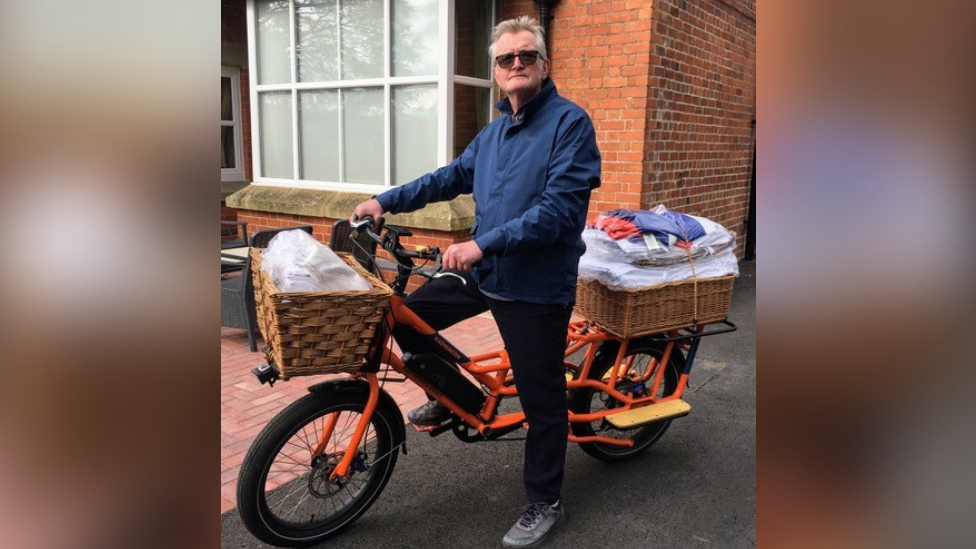
Tim Withers can transport his B&B's laundry load to the cleaners by bike
Another happy graduate of the E-Move scheme is Tim Withers, who has been running the Old Vicarage Bed and Breakfast in Dolfor, Powys, for 17 years with his wife Helen.
Always a keen cyclist, he got a call from Sustrans which had heard he was considering getting a cargo bike and asked if he would like to take part in a free trial of an electric one.
"I trialled it for four weeks and I was very impressed, although not by the price," he said, explaining the model he used cost £6,000, so he did his research and found an equivalent for just over £1,750.
Tim has cycled 1,500 miles on his e-bike since starting in February and has saved hundreds of pounds or more on transport costs.
"We only use our car once or twice a month, mainly for things I literally can't get on the cargo bike.
"I use [the bike] six days a week for shopping, laundry and recycling. Although I have got two baskets front and back I can detach them and put on a flat-bed trailer to carry bigger loads."
The couple have also bought an e-scooter and are considering getting rid of their car altogether when it is due for its next MOT.
"We're lucky because being in Newtown we're on the Cambrian [train] line. We use the local train a lot, mainly to go to Shrewsbury which is our nearest town, and we're also on the T4 bus service route from Cardiff so we can get about quite easily."
Although Tim was already a regular cyclist, he thinks e-bikes "just changes people's mindsets".
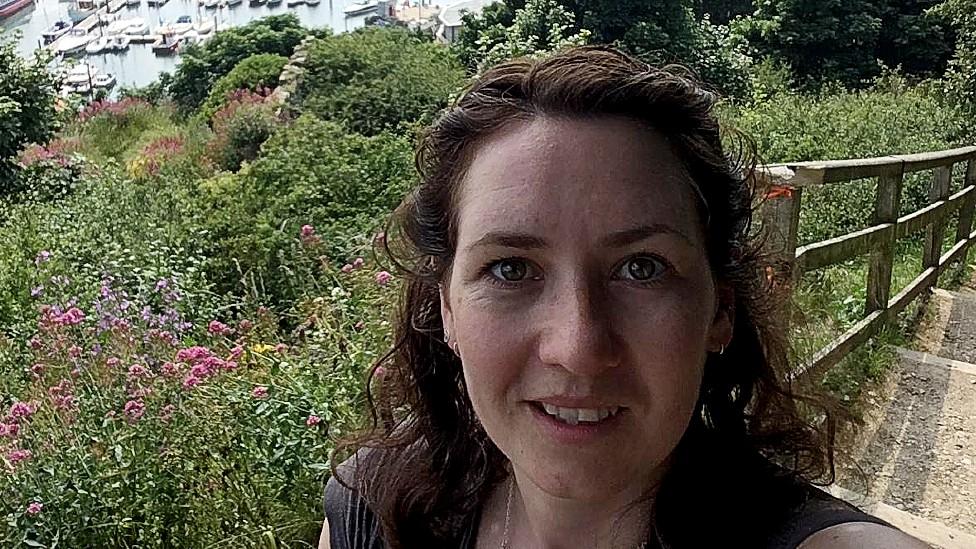
Emily Sinclair of Sustrans would like to see more financial support for e-bike purchases
Emily Sinclair, E-Move coordinator at Sustrans, said the project, which is funded by the Welsh government, began as a way of breaking down some of the barriers people in Wales faced when walking or cycling.
"Obviously it's very hilly and the electric bikes can be a great way to bridge that gap between people that want to be travelling more sustainably but find that these hills make it impossible to do that," she said.
The project is running in Aberystwyth, Rhyl and Swansea, as well as Barry and Newtown, all of which have some challenging hills.
As well as the four-week loan of the bike itself, people are offered accessories, such as child seats and baskets and about 400 people have taken part in just over 12 months.
So far the feedback has been positive. "People are just blown away by how much power the bikes have and it just changes people's mindsets completely about using a bike," said Emily.
"You get to work, you're not particularly sweaty, you don't feel flustered - you can just go into work and start work."
Like Gemma, Emily wants to see more financial support for e-bikes: "There definitely needs to be more schemes to help people gradually pay off the cost of a bike because a big lump sum is just not affordable for a lot of people."
- Published16 January 2022
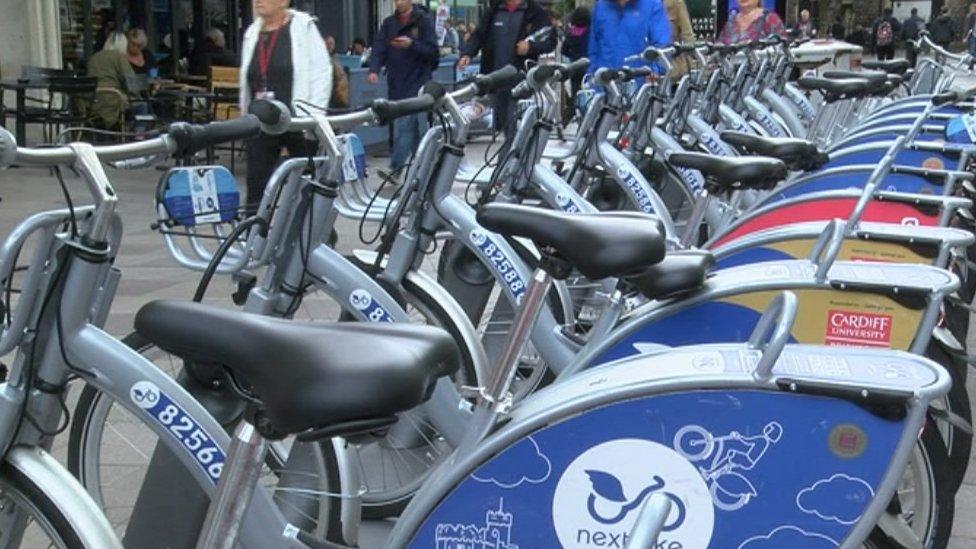
- Published5 January 2021
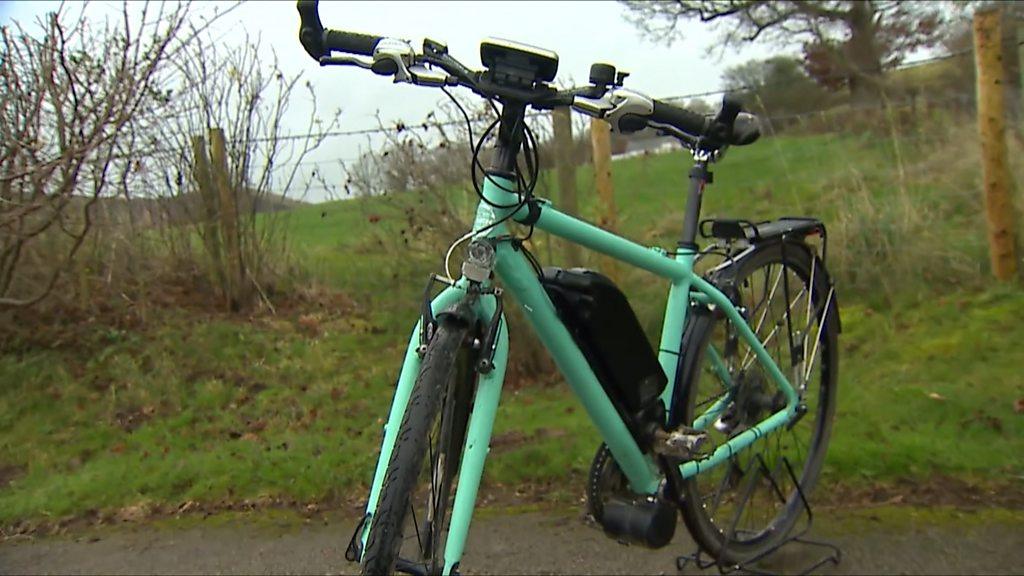
- Published7 October 2019

- Published19 August 2022

- Published4 August 2022
- Published6 October 2022
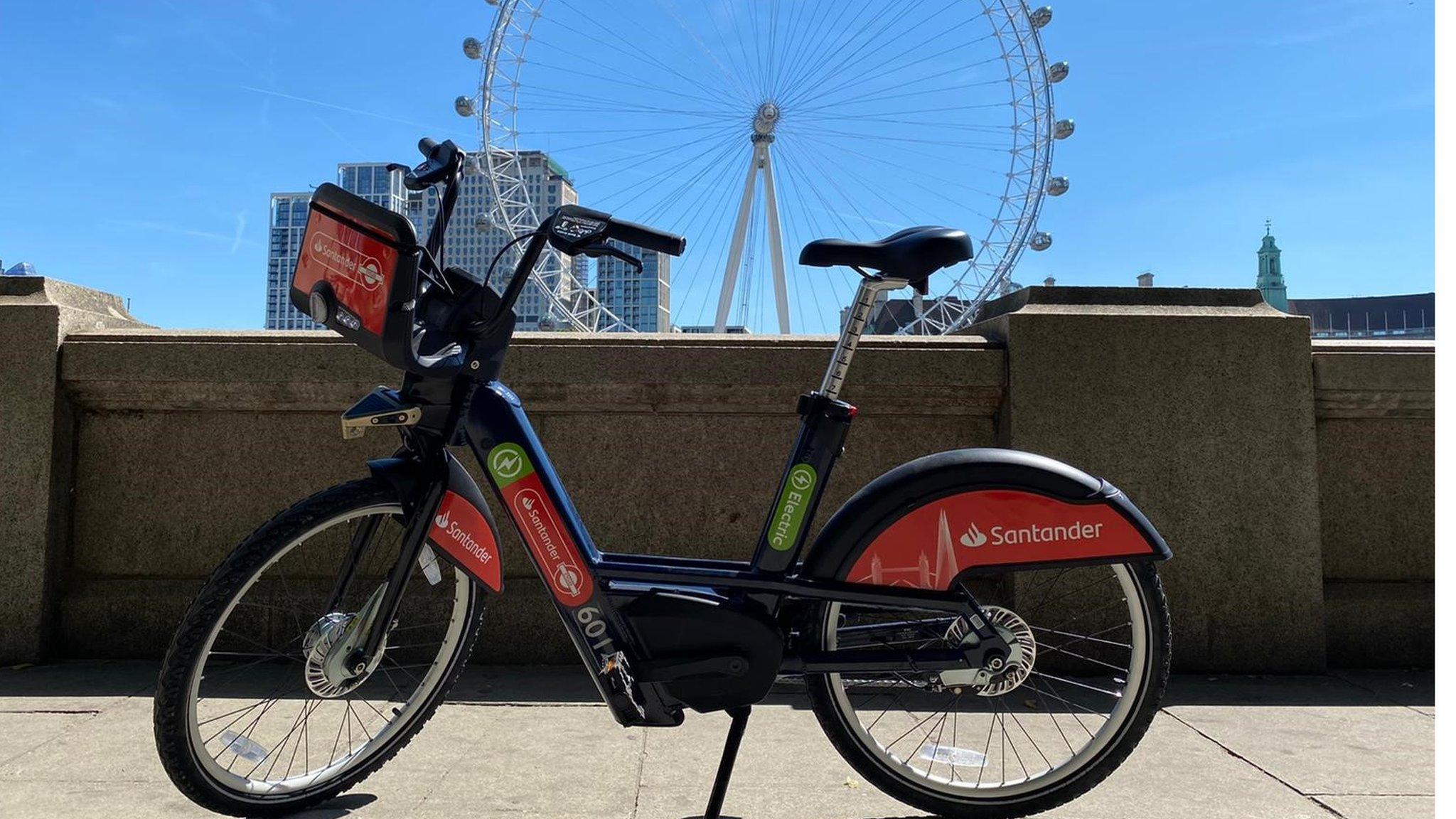
- Published2 November 2022
